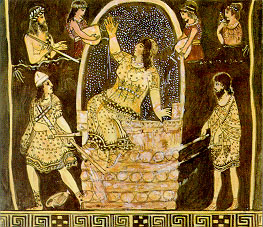return to Home Page
or move on to Goddess Alcyone, next chronologically,
or use Her Cyclopedia Index
Alcmene, Power-of-the-Moon.
*LKM]NA
Alternate meanings: Strength-of-the-Moon, Mighty-in-Wrath, Strong-in-wrath.
[to Whom the eleventh day of January, day 010, is dedicated]

Geography/Culture: Greek. Alcmene is worshipped in Athens but is especially associated with Thebes, Boeotia. One of Her tombs is shown at Haliartus, Boeotia. She is pre-Hellenic, probably originally a Mycenaean (1400-1150 BC) Goddess -- as a mortal she is said to be the daughter of Electryon, a king of Mycenae.
Linguistic Note: Her name may be derived from the Greek element alpha-lambda-kappa- (alk- as in alpha-lambda-kappa-alpha-iota-omikron-sigma, alkaios), alkaios, strong, mighty, powerful, and mu-eta-nu-eta, (mene), the moon. Some say Her name is a Cretan word the meaning of which is unknown. The orthography used is the English spelling convention as adopted from the Latin tradition of transcribing Greek words. A common European orthography, Alkmene, iscloser to the original Greek.
Description: Virgin Goddess of mid-winter, the mid-winter moon and the New Year; She Who introduced the burning of scrub in late winter to encourage springtime growth; She Who epitomizes wisdom, {steadfastness}, beauty, and stateliness; Mother of the Heracleidae.
As the mortal with whom Zeus lay to conceive Heracles, Alcmene may have been the title of the Moon-Goddess priestess in whom the Goddess was incarnate.
To Whom Sacred: wild-olive (the Greek New Year tree, symbol of inception -- it was used as a besom to expel evil spirits -- equivalent to the birch in Europe); grove (or plantation) of a type of tough cane from Crete
used for making flutes and javelins (Her tomb at Haliartus is close by such a grove); boar; {perhaps, see below} weasel; The Carcheia Goblet (presented to Her by Zeus -- Carcheia may be a reference to Carchemish, an ancient Hittite city on the Euphrates).
Festival: Year End Solstice. Some say Heracles was born at mid-winter (i.e. the Year End Solstice of the Northern Hemisphere), when the Theban New Year was celebrated) and that Alcmene's sacrifice of a boar to Zeus after Heracles killed the snakes in his crib is remembered in the Old English Boar's Head Feast of Yuletide. Other's say he was born at the First Equinox, the New Year for Italians, Babylonians and others.
Male Associates: son, Alceides, who later became known as Heracles, Glory-of-Hera, (Latin variant: Hercules). He is sometimes said to be Virgin-born, though some say he was fathered by Zeus in the disguise of Alcmene's first consort Amphitryon. And twin son Iphicles, by Amphitryon himself. Her second consort was Rhadamanthys, Divining-with-a-Wand, one of the three judges of the dead (he resides in the Elysian fields).
Titles/Variants, etc:
- Transcription variant
Alcmena.
- Transcription variant
Alkmene.
- Some say Her Mother was Eurydice, Wide-Justice, Who is linked with Persephoneia, Bringer-of-Destruction.
- Her hand-maiden is Galanthis, Weasel, below.
- Perhaps connected with Halia, Of-the-Sea, (Who is linked with Ino, She-Who-Makes-Sinewy), by Her tomb at Haliartus.
- It is said that Alcmene, Power-of-the-Moon, is one of the Mycenaean titles of Hera, Our-Lady, as Goddess of the moon. This explains why, in Her later Greek form, Hera is said to have fostered (i.e. suckled) Heracles, and later adopted him -- he was already Her son!
- Alcmene, and Her son Heracles, the God of the New Year, became assimilated to Mary, {Sea-Queen}, and Her son Jesus, the ever familiar Madonna & child.
Source: Encyclopedia Britannica, 13th edition; Graves GMv1 250, 294, 298; Graves GMv2 40, 85-90, 94; Rose HGM 206, 342; Walker WEMS 22. Illustration: The Madonna and child image for Alcmene is from a line drawing by Angela Lowry, 1990-1991.
Galanthis, Weasel.
G*L*N3YS
Geography/Culture: Theban.
Linguistic Note: Greek orthography gamma-alpha-lambda-alpha-nu-theta-iota-sigma, (galanthis), variant gamma-alpha-lambda-iota-nu-theta-iota-alpha-sigma (galinthias), perhaps from gamma-alpha-lambda-epsilon-nu, (galen), weasel, marten-cat or polecat. Perhaps from gamma-alpha-lambda-epsilon-omega-tau-eta-sigma (galeotes), a spotted lizard. {Perhaps from gamma-alpha-lambda-epsilon-nu-omikron-sigma, calm, gentle.} For language, and or transcription variants of Her name see below.
Description: Fair haired Goddess of lust, child-birth, midwifery, nursing and perhaps witchcraft; She Who was called a harlot by the Athenians; Hand-maiden of Alcmene, Strength-of-the-Moon.
To Whom Sacred: weasel (Thessalian witches took the form of weasels -- some say She, Galanthis, ran past, in weasel form, when Alcmene was in labor and frightened Her into delivery. It is perhaps also of interest that
weasels, when disturbed, carry their young in their mouths to a new nest-site -- this observation gave rise to the legend that weasels give birth through the mouth); lizard; yellow hair.
Male Associate: The Thebans offered sacrifice to Her, before paying Heracles divine honors, because She assisted at his birth.
Titles/Variants, etc:
- Hand-maiden of Alcmene, Power-of-the-Moon, above.
- Compare with Cerdo, Wily-One, Who is linked with Car, Queen-Bee.
- Some say She was turned into a weasel (some say a lizard) by Eileithyia, She-Who-Aids-Women-in-Labour, for interfering with Eileithyia's attempt to delay Heracles' birth.
- Variant:
Galanthias.
- Variant:
Galen.
- The Athenians said She was turned into a weasel by Hecate, She-Who-Works-From-Afar, for practicing unnatural lust. It is also possible that Her name is a title of a priestess of Hecate.
- Her worship in Thebes was a relic of primitive Hera, Our-Lady, worship.
- See also Hulda, The-Benignant, linguistic notes.
Source: Graves GMv2 118,g,5; Rose HGM 207, 347. Illustration:
Long-tailed weasel (in summer coat). Plate 67 Complete Field Guide to
North American Wild Life, Western Edition. Harper & Row, copyright
1981.
worked on file: December, September, May 1995; August 1993; August 1991; July, June 1990.
Return to the top of this document.
